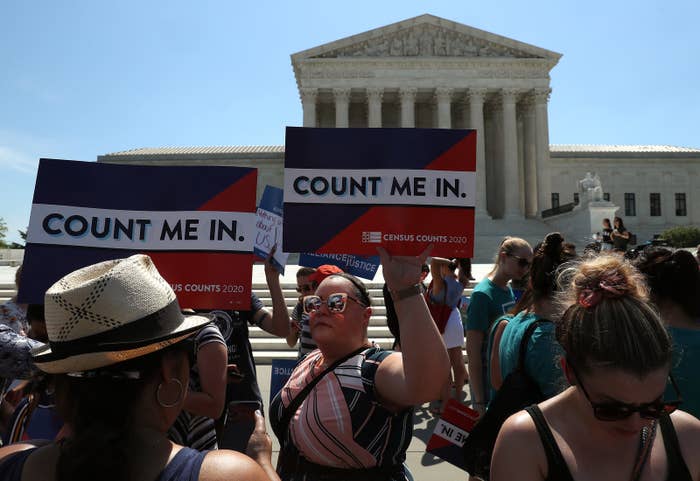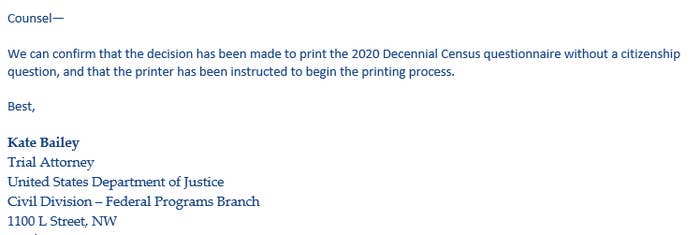
WASHINGTON — The Trump administration will carry out the 2020 Census without a citizenship question, according to an email the Justice Department sent Tuesday to groups that sued over the question, marking a huge victory for Democrats and civil rights advocates.
In the email, which was announced via Twitter by civil rights lawyers and independently obtained and verified by BuzzFeed News, a Justice Department trial attorney notified lawyers for the challengers about the administration's decision. The notice came a week after the US Supreme Court ruled that the administration could not add the question, at least not based on the record before the court at the time.
"We can confirm that the decision has been made to print the 2020 Decennial Census questionnaire without a citizenship question, and that the printer has been instructed to begin the printing process," DOJ lawyer Kate Bailey wrote.

Although the Supreme Court's decision represented an immediate loss for the administration, it left open the possibility of adding a citizenship question in the future. A majority of the justices — Chief Justice John Roberts Jr. joined the court's more liberal wing — concluded that Commerce Secretary Wilbur Ross had given a "contrived" reason for adding the question now.
But the opinion was divided into sections. In another part, a different majority of justices — this time, Roberts plus the court's more conservative wing — held that a citizenship question wasn't unconstitutional on its face. This led to speculation that the Trump administration might try to delay the count to come up with a legal strategy that could pass another review by the courts. After the decision came out, Trump tweeted that he'd asked "the lawyers" if they could find a way to delay it.
Seems totally ridiculous that our government, and indeed Country, cannot ask a basic question of Citizenship in a very expensive, detailed and important Census, in this case for 2020. I have asked the lawyers if they can delay the Census, no matter how long, until the.....
The Justice Department's notice to the challengers on Tuesday signaled that the administration was dropping the fight, however. Ross released a statement saying he still "strongly" disagreed with the Supreme Court's decision.
"I respect the Supreme Court but strongly disagree with its ruling regarding my decision to reinstate a citizenship question on the 2020 Census. The Census Bureau has started the process of printing the decennial questionnaires without the question. My focus, and that of the Bureau and the entire Department is to conduct a complete and accurate census," Ross said.
Ross announced in March 2018 that he would add a citizenship question to the census questionnaire. Civil rights and immigrant advocacy groups filed challenges in federal courts across the country, arguing that Ross had failed to follow federal law in adopting the question, and that it was motivated by a discriminatory purpose, citing evidence that adding the question would depress the count in immigrant communities.
A case filed in federal court in Manhattan made it to the justices first. In that case, the lower court judge found that Ross did violate the law and go beyond his authority, but also wrote that the record didn't support the allegation that there was unconstitutional discrimination involved. Federal judges in Maryland and California also blocked the administration from adding the question; the Supreme Court agreed to hear the case right away, bypassing review at the appeals court level.
While the cases were pending, the challengers discovered new materials on the hard drive of a dead Republican strategist that they argued bolstered the discrimination claim. The strategist, Thomas Hofeller, had done a study in 2015 about using citizen population data to draw electoral districts, and written that it would "be advantageous to Republicans and Non-Hispanic Whites."
The Supreme Court issued its decision last week over a request from the challengers to consider the new evidence from Hofeller's files, but the judges in New York and Maryland agreed to reopen the proceedings in their courts, potentially setting the stage for another round of litigation. The status of those cases was not immediately clear now that the question is off the form — in New York, for instance, the challengers, represented by the American Civil Liberties Union, have argued the government "concealed" information about Hofeller's role and asked the judge to consider ordering sanctions.
An ACLU spokesperson did not immediately return a request for comment about next steps in the case. Dale Ho, director of the group's Voting Rights Project, who argued for the challengers before the Supreme Court, said in a statement that the administration "had no choice" following the court's decision.
"Everyone in America counts in the census, and today's decision means we all will," Ho said.
A Justice Department spokesperson did not immediately return a request for comment.
This is a developing story. Check back for updates.

